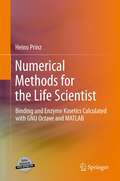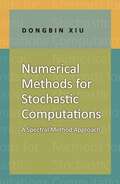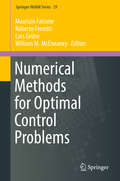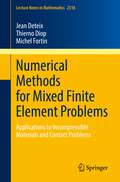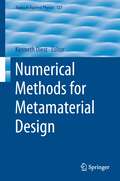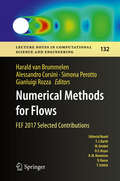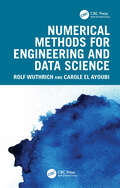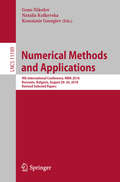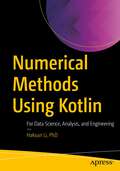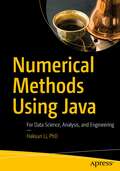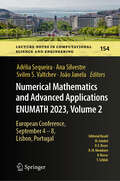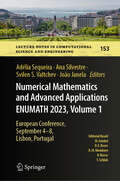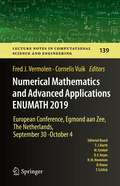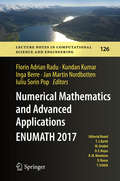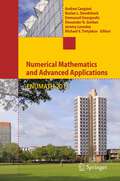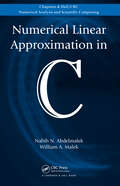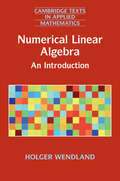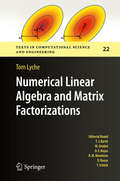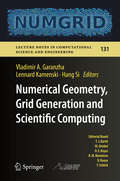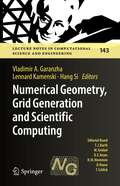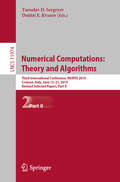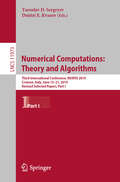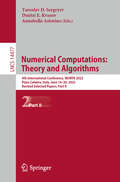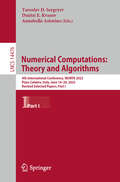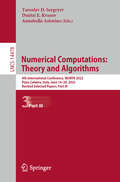- Table View
- List View
Numerical Methods for the Life Scientist
by Heino PrinzEnzyme kinetics, binding kinetics and pharmacological dose-response curves are currently analyzed by a few standard methods. Some of these, like Michaelis-Menten enzyme kinetics, use plausible approximations, others, like Hill equations for dose-response curves, are outdated. Calculating realistic reaction schemes requires numerical mathematical routines which usually are not covered in the curricula of life science. This textbook will give a step-by-step introduction to numerical solutions of non-linear and differential equations. It will be accompanied with a set of programs to calculate any reaction scheme on any personal computer. Typical examples from analytical biochemistry and pharmacology can be used as versatile templates. When a reaction scheme is applied for data fitting, the resulting parameters may not be unique. Correlation of parameters will be discussed and simplification strategies will be offered.
Numerical Methods for Stochastic Computations: A Spectral Method Approach
by Dongbin XiuThe@ first graduate-level textbook to focus on fundamental aspects of numerical methods for stochastic computations, this book describes the class of numerical methods based on generalized polynomial chaos (gPC). These fast, efficient, and accurate methods are an extension of the classical spectral methods of high-dimensional random spaces. Designed to simulate complex systems subject to random inputs, these methods are widely used in many areas of computer science and engineering. The book introduces polynomial approximation theory and probability theory; describes the basic theory of gPC methods through numerical examples and rigorous development; details the procedure for converting stochastic equations into deterministic ones; using both the Galerkin and collocation approaches; and discusses the distinct differences and challenges arising from high-dimensional problems. The last section is devoted to the application of gPC methods to critical areas such as inverse problems and data assimilation. Ideal for use by graduate students and researchers both in the classroom and for self-study, Numerical Methods for Stochastic Computations provides the required tools for in-depth research related to stochastic computations. The first graduate-level textbook to focus on the fundamentals of numerical methods for stochastic computations Ideal introduction for graduate courses or self-study Fast, efficient, and accurate numerical methods Polynomial approximation theory and probability theory included Basic gPC methods illustrated through examples
Numerical Methods for Optimal Control Problems (Springer INdAM Series #29)
by Lars Grüne Maurizio Falcone Roberto Ferretti William M. McEneaneyThis work presents recent mathematical methods in the area of optimal control with a particular emphasis on the computational aspects and applications. Optimal control theory concerns the determination of control strategies for complex dynamical systems, in order to optimize some measure of their performance. Started in the 60's under the pressure of the "space race" between the US and the former USSR, the field now has a far wider scope, and embraces a variety of areas ranging from process control to traffic flow optimization, renewable resources exploitation and management of financial markets. These emerging applications require more and more efficient numerical methods for their solution, a very difficult task due the huge number of variables. The chapters of this volume give an up-to-date presentation of several recent methods in this area including fast dynamic programming algorithms, model predictive control and max-plus techniques. This book is addressed to researchers, graduate students and applied scientists working in the area of control problems, differential games and their applications.
Numerical Methods for Mixed Finite Element Problems: Applications to Incompressible Materials and Contact Problems (Lecture Notes in Mathematics #2318)
by Michel Fortin Jean Deteix Thierno DiopThis book focuses on iterative solvers and preconditioners for mixed finite element methods. It provides an overview of some of the state-of-the-art solvers for discrete systems with constraints such as those which arise from mixed formulations.Starting by recalling the basic theory of mixed finite element methods, the book goes on to discuss the augmented Lagrangian method and gives a summary of the standard iterative methods, describing their usage for mixed methods. Here, preconditioners are built from an approximate factorisation of the mixed system.A first set of applications is considered for incompressible elasticity problems and flow problems, including non-linear models.An account of the mixed formulation for Dirichlet’s boundary conditions is then given before turning to contact problems, where contact between incompressible bodies leads to problems with two constraints.This book is aimed at graduate students and researchers in the field of numerical methods and scientific computing.
Numerical Methods for Metamaterial Design
by Kenneth DiestThis book describes a relatively new approach for the design of electromagnetic metamaterials. Numerical optimization routines are combined with electromagnetic simulations to tailor the broadband optical properties of a metamaterial to have predetermined responses at predetermined wavelengths. After a review of both the major efforts within the field of metamaterials and the field of mathematical optimization, chapters covering both gradient-based and derivative-free design methods are considered. Selected topics including surrogate-base optimization, adaptive mesh search, and genetic algorithms are shown to be effective, gradient-free optimization strategies. Additionally, new techniques for representing dielectric distributions in two dimensions, including level sets, are demonstrated as effective methods for gradient-based optimization. Each chapter begins with a rigorous review of the optimization strategy used, and is followed by numerous examples that combine the strategy with either electromagnetic simulations or analytical solutions of the scattering problem. Throughout the text, we address the strengths and limitations of each method, as well as which numerical methods are best suited for different types of metamaterial designs. This book is intended to provide a detailed enough treatment of the mathematical methods used, along with sufficient examples and additional references, that senior level undergraduates or graduate students who are new to the fields of plasmonics, metamaterials, or optimization methods; have an understanding of which approaches are best-suited for their work and how to implement the methods themselves.
Numerical Methods for Flows: FEF 2017 Selected Contributions (Lecture Notes in Computational Science and Engineering #132)
by Gianluigi Rozza Simona Perotto Harald Van Brummelen Alessandro CorsiniThis book includes selected contributions on applied mathematics, numerical analysis, numerical simulation and scientific computing related to fluid mechanics problems, presented at the FEF-“Finite Element for Flows” conference, held in Rome in spring 2017. Written by leading international experts and covering state-of-the-art topics in numerical simulation for flows, it provides fascinating insights into and perspectives on current and future methodological and numerical developments in computational science. As such, the book is a valuable resource for researchers, as well as Masters and Ph.D students.
Numerical Methods for Engineering and Data Science
by Rolf Wuthrich Carole El AyoubiNumerical Methods for Engineering and Data Science guides students in implementing numerical methods in engineering and in assessing their limitations and accuracy, particularly using algorithms from the field of machine learning.The textbook presents key principles building upon the fundamentals of engineering mathematics. It explores classical techniques for solving linear and nonlinear equations, computing definite integrals and differential equations. Emphasis is placed on the theoretical underpinnings, with an in-depth discussion of the sources of errors, and in the practical implementation of these using Octave. Each chapter is supplemented with examples and exercises designed to reinforce the concepts and encourage hands-on practice. The second half of the book transitions into the realm of machine learning. The authors introduce basic concepts and algorithms, such as linear regression and classification. As in the first part of this book, a special focus is on the solid understanding of errors and practical implementation of the algorithms. In particular, the concepts of bias, variance, and noise are discussed in detail and illustrated with numerous examples.This book will be of interest to students in all areas of engineering, alongside mathematicians and scientists in industry looking to improve their knowledge of this important field.
Numerical Methods and Applications: 9th International Conference, NMA 2018, Borovets, Bulgaria, August 20-24, 2018, Revised Selected Papers (Lecture Notes in Computer Science #11189)
by Krassimir Georgiev Geno Nikolov Natalia KolkovskaThis book constitutes the thoroughly refereed post-conference proceedings of the 9th International Conference on Numerical Methods and Applications, NMA 2018, held in Borovets, Bulgaria, in August 2018. The 56 revised regular papers presented were carefully reviewed and selected from 61 submissions for inclusion in this book. The papers are organized in the following topical sections: numerical search and optimization; problem-driven numerical method: motivation and application, numerical methods for fractional diffusion problems; orthogonal polynomials and numerical quadratures; and Monte Carlo and Quasi-Monte Carlo methods.
Numerical Methods Using Kotlin: For Data Science, Analysis, and Engineering
by Haksun Li, PhDThis in-depth guide covers a wide range of topics, including chapters on linear algebra, root finding, curve fitting, differentiation and integration, solving differential equations, random numbers and simulation, a whole suite of unconstrained and constrained optimization algorithms, statistics, regression and time series analysis. The mathematical concepts behind the algorithms are clearly explained, with plenty of code examples and illustrations to help even beginners get started.In this book, you'll implement numerical algorithms in Kotlin using NM Dev, an object-oriented and high-performance programming library for applied and industrial mathematics. Discover how Kotlin has many advantages over Java in its speed, and in some cases, ease of use. In this book, you’ll see how it can help you easily create solutions for your complex engineering and data science problems. After reading this book, you'll come away with the knowledge to create your own numerical models and algorithms using the Kotlin programming language. What You Will LearnProgram in Kotlin using a high-performance numerical libraryLearn the mathematics necessary for a wide range of numerical computing algorithmsConvert ideas and equations into codePut together algorithms and classes to build your own engineering solutionsBuild solvers for industrial optimization problemsPerform data analysis using basic and advanced statisticsWho This Book Is ForProgrammers, data scientists, and analysts with prior experience programming in any language, especially Kotlin or Java.
Numerical Methods Using Java: For Data Science, Analysis, and Engineering
by Haksun Li, PhDImplement numerical algorithms in Java using NM Dev, an object-oriented and high-performance programming library for mathematics.You’ll see how it can help you easily create a solution for your complex engineering problem by quickly putting together classes.Numerical Methods Using Java covers a wide range of topics, including chapters on linear algebra, root finding, curve fitting, differentiation and integration, solving differential equations, random numbers and simulation, a whole suite of unconstrained and constrained optimization algorithms, statistics, regression and time series analysis. The mathematical concepts behind the algorithms are clearly explained, with plenty of code examples and illustrations to help even beginners get started. What You Will Learn Program in Java using a high-performance numerical libraryLearn the mathematics for a wide range of numerical computing algorithmsConvert ideas and equations into codePut together algorithms and classes to build your own engineering solutionBuild solvers for industrial optimization problemsDo data analysis using basic and advanced statisticsWho This Book Is For Programmers, data scientists, and analysts with prior experience with programming in any language, especially Java.
Numerical Mathematics and Advanced Applications ENUMATH 2023, Volume 2: European Conference, September 4-8, Lisbon, Portugal (Lecture Notes in Computational Science and Engineering #154)
by Adélia Sequeira Ana Silvestre Svilen S. Valtchev João JanelaThis book gathers outstanding papers presented at the European Conference on Numerical Mathematics and Advanced Applications, ENUMATH 2023. The conference was held in Lisbon, Portugal, in September 2023. Leading experts in the field presented the latest results and ideas regarding the design, implementation and analysis of numerical algorithms, as well as their applications to relevant societal problems. ENUMATH is a series of conferences held every two years to provide a forum for discussing basic aspects and new trends in numerical mathematics and its scientific and industrial applications, all examined at the highest level of international expertise. The first ENUMATH was held in Paris in 1995, with successive installments at various sites across Europe, including Heidelberg (1997), Jyvaskyla (1999), lschia Porto (2001), Prague (2003), Santiago de Compostela (2005), Graz (2007), Uppsala (2009), Leicester (2011), Lausanne (2013), Ankara (2015), Bergen (2017), and Egmond aan Zee (2019).
Numerical Mathematics and Advanced Applications ENUMATH 2023, Volume 1: European Conference, September 4-8, Lisbon, Portugal (Lecture Notes in Computational Science and Engineering #153)
by Adélia Sequeira Ana Silvestre Svilen S. Valtchev João JanelaThis book gathers outstanding papers presented at the European Conference on Numerical Mathematics and Advanced Applications, ENUMATH 2023. The conference was held in Lisbon, Portugal, in September 2023. Leading experts in the field presented the latest results and ideas regarding the design, implementation and analysis of numerical algorithms, as well as their applications to relevant societal problems. ENUMATH is a series of conferences held every two years to provide a forum for discussing basic aspects and new trends in numerical mathematics and its scientific and industrial applications, all examined at the highest level of international expertise. The first ENUMATH was held in Paris in 1995, with successive installments at various sites across Europe, including Heidelberg (1997), Jyvaskyla (1999), lschia Porto (2001), Prague (2003), Santiago de Compostela (2005), Graz (2007), Uppsala (2009), Leicester (2011), Lausanne (2013), Ankara (2015), Bergen (2017), and Egmond aan Zee (2019).
Numerical Mathematics and Advanced Applications ENUMATH 2019: European Conference, Egmond aan Zee, The Netherlands, September 30 - October 4 (Lecture Notes in Computational Science and Engineering #139)
by Cornelis Vuik Fred J. VermolenThis book gathers outstanding papers presented at the European Conference on Numerical Mathematics and Advanced Applications (ENUMATH 2019). The conference was organized by Delft University of Technology and was held in Egmond aan Zee, the Netherlands, from September 30 to October 4, 2019. Leading experts in the field presented the latest results and ideas regarding the design, implementation and analysis of numerical algorithms, as well as their applications to relevant societal problems.ENUMATH is a series of conferences held every two years to provide a forum for discussing basic aspects and new trends in numerical mathematics and scientific and industrial applications, all examined at the highest level of international expertise. The first ENUMATH was held in Paris in 1995, with successive installments at various sites across Europe, including Heidelberg (1997), Jyvaskyla (1999), lschia Porto (2001), Prague (2003), Santiago de Compostela (2005), Graz (2007), Uppsala (2009), Leicester (2011), Lausanne (2013), Ankara (2015) and Bergen (2017).
Numerical Mathematics and Advanced Applications ENUMATH 2017 (Lecture Notes in Computational Science and Engineering #126)
by Jan Martin Nordbotten Florin Adrian Radu Kundan Kumar Inga Berre Iuliu Sorin PopThis book collects many of the presented papers, as plenary presentations, mini-symposia invited presentations, or contributed talks, from the European Conference on Numerical Mathematics and Advanced Applications (ENUMATH) 2017. The conference was organized by the University of Bergen, Norway from September 25 to 29, 2017. Leading experts in the field presented the latest results and ideas in the designing, implementation, and analysis of numerical algorithms as well as their applications to relevant, societal problems.ENUMATH is a series of conferences held every two years to provide a forum for discussing basic aspects and new trends in numerical mathematics and scientific and industrial applications. These discussions are upheld at the highest level of international expertise. The first ENUMATH conference was held in Paris in 1995 with successive conferences being held at various locations across Europe, including Heidelberg (1997), Jyvaskyla (1999), lschia Porto (2001), Prague (2003), Santiago de Compostela (2005), Graz (2007), Uppsala (2009), Leicester (2011), Lausanne (2013), and Ankara (2015).
Numerical Mathematics and Advanced Applications 2011
by Alexander N. Gorban Andrea Cangiani Emmanuil Georgoulis Jeremy Levesley Michael V. Tretyakov Ruslan L DavidchackThe European Conferences on Numerical Mathematics and Advanced Applications (ENUMATH) are a series of conferences held every two years to provide a forum for discussion of new trends in numerical mathematics and challenging scientific and industrial applications at the highest level of international expertise. ENUMATH 2011 was hosted by the University of Leicester (UK) from the 5th to 9th September 2011. This proceedings volume contains more than 90 papers by speakers of the conference and gives an overview of recent developments in scientific computing, numerical analysis, and practical use of modern numerical techniques and algorithms in various applications. New results on finite element methods, multiscale methods, numerical linear algebra, and finite difference schemes are presented. A range of applications include computational problems from fluid dynamics, materials, image processing, and molecular dynamics.
Numerical Linear Approximation in C
by Nabih Abdelmalek William A. MalekIllustrating the relevance of linear approximation in a variety of fields, Numerical Linear Approximation in C presents a unique collection of linear approximation algorithms that can be used to analyze, model, and compress discrete data. Developed by the lead author, the algorithms have been successfully applied to several engineering proje
Numerical Linear Algebra: An Introduction (Cambridge Texts in Applied Mathematics #56)
by Holger WendlandThis self-contained introduction to numerical linear algebra provides a comprehensive, yet concise, overview of the subject. It includes standard material such as direct methods for solving linear systems and least-squares problems, error, stability and conditioning, basic iterative methods and the calculation of eigenvalues. Later chapters cover more advanced material, such as Krylov subspace methods, multigrid methods, domain decomposition methods, multipole expansions, hierarchical matrices and compressed sensing. The book provides rigorous mathematical proofs throughout, and gives algorithms in general-purpose language-independent form. Requiring only a solid knowledge in linear algebra and basic analysis, this book will be useful for applied mathematicians, engineers, computer scientists, and all those interested in efficiently solving linear problems.
Numerical Linear Algebra and Matrix Factorizations (Texts in Computational Science and Engineering #22)
by Tom LycheAfter reading this book, students should be able to analyze computational problems in linear algebra such as linear systems, least squares- and eigenvalue problems, and to develop their own algorithms for solving them. Since these problems can be large and difficult to handle, much can be gained by understanding and taking advantage of special structures. This in turn requires a good grasp of basic numerical linear algebra and matrix factorizations. Factoring a matrix into a product of simpler matrices is a crucial tool in numerical linear algebra, because it allows us to tackle complex problems by solving a sequence of easier ones. The main characteristics of this book are as follows: It is self-contained, only assuming that readers have completed first-year calculus and an introductory course on linear algebra, and that they have some experience with solving mathematical problems on a computer. The book provides detailed proofs of virtually all results. Further, its respective parts can be used independently, making it suitable for self-study. The book consists of 15 chapters, divided into five thematically oriented parts. The chapters are designed for a one-week-per-chapter, one-semester course. To facilitate self-study, an introductory chapter includes a brief review of linear algebra.
Numerical Geometry, Grid Generation and Scientific Computing: Proceedings of the 9th International Conference, NUMGRID 2018 / Voronoi 150, Celebrating the 150th Anniversary of G.F. Voronoi, Moscow, Russia, December 2018 (Lecture Notes in Computational Science and Engineering #131)
by Vladimir A. Garanzha Lennard Kamenski Hang SiThe focus of these conference proceedings is on research, development, and applications in the fields of numerical geometry, scientific computing and numerical simulation, particularly in mesh generation and related problems. In addition, this year’s special focus is on Voronoi diagrams and their applications, celebrating the 150th birthday of G.F. Voronoi. In terms of content, the book strikes a balance between engineering algorithms and mathematical foundations. It presents an overview of recent advances in numerical geometry, grid generation and adaptation in terms of mathematical foundations, algorithm and software development and applications. The specific topics covered include: quasi-conformal and quasi-isometric mappings, hyperelastic deformations, multidimensional generalisations of the equidistribution principle, discrete differential geometry, spatial and metric encodings, Voronoi-Delaunay theory for tilings and partitions, duality in mathematical programming and numerical geometry, mesh-based optimisation and optimal control methods. Further aspects examined include iterative solvers for variational problems and algorithm and software development. The applications of the methods discussed are multidisciplinary and include problems from mathematics, physics, biology, chemistry, material science, and engineering.
Numerical Geometry, Grid Generation and Scientific Computing: Proceedings of the 10th International Conference, NUMGRID 2020 / Delaunay 130, Celebrating the 130th Anniversary of Boris Delaunay, Moscow, Russia, November 2020 (Lecture Notes in Computational Science and Engineering #143)
by Vladimir A. Garanzha Lennard Kamenski Hang SiThe focus of these conference proceedings is on research, development, and applications in the fields of numerical geometry, scientific computing and numerical simulation, particularly in mesh generation and related problems. In addition, this year’s special focus is on Delaunay triangulations and their applications, celebrating the 130th birthday of Boris Delaunay. In terms of content, the book strikes a balance between engineering algorithms and mathematical foundations. It presents an overview of recent advances in numerical geometry, grid generation and adaptation in terms of mathematical foundations, algorithm and software development and applications. The specific topics covered include: quasi-conformal and quasi-isometric mappings, hyperelastic deformations, multidimensional generalisations of the equidistribution principle, discrete differential geometry, spatial and metric encodings, Voronoi-Delaunay theory for tilings and partitions, duality in mathematical programming and numerical geometry, mesh-based optimisation and optimal control methods. Further aspects examined include iterative solvers for variational problems and algorithm and software development. The applications of the methods discussed are multidisciplinary and include problems from mathematics, physics, biology, chemistry, material science, and engineering.
Numerical Computations: Third International Conference, NUMTA 2019, Crotone, Italy, June 15–21, 2019, Revised Selected Papers, Part II (Lecture Notes in Computer Science #11974)
by Yaroslav D. Sergeyev Dmitri E. KvasovThe two-volume set LNCS 11973 and 11974 constitute revised selected papers from the Third International Conference on Numerical Computations: Theory and Algorithms, NUMTA 2019, held in Crotone, Italy, in June 2019. This volume, LNCS 11974, consists of 19 full and 32 short papers chosen among regular papers presented at the the Conference including also the paper of the winner (Lorenzo Fiaschi, Pisa, Italy) of The Springer Young Researcher Prize for the best NUMTA 2019 presentation made by a young scientist. The papers in part II explore the advanced research developments in such interconnected fields as local and global optimization, machine learning, approximation, and differential equations. A special focus is given to advanced ideas related to methods and applications using emerging computational paradigms.
Numerical Computations: Third International Conference, NUMTA 2019, Crotone, Italy, June 15–21, 2019, Revised Selected Papers, Part I (Lecture Notes in Computer Science #11973)
by Yaroslav D. Sergeyev Dmitri E. KvasovThe two-volume set LNCS 11973 and 11974 constitute revised selected papers from the Third International Conference on Numerical Computations: Theory and Algorithms, NUMTA 2019, held in Crotone, Italy, in June 2019. This volume, LNCS 11973, consists of 34 full and 18 short papers chosen among papers presented at special streams and sessions of the Conference. The papers in part I were organized following the topics of these special sessions: approximation: methods, algorithms, and applications; computational methods for data analysis; first order methods in optimization: theory and applications; high performance computing in modelling and simulation; numbers, algorithms, and applications; optimization and management of water supply.
Numerical Computations: 4th International Conference, NUMTA 2023, Pizzo Calabro, Italy, June 14–20, 2023, Revised Selected Papers, Part II (Lecture Notes in Computer Science #14477)
by Yaroslav D. Sergeyev Dmitri E. Kvasov Annabella AstorinoThe three-volume set LNCS 14476-14478 constitutes the post conference proceedings of the 4th International Conference on Numerical Computations: Theory and Algorithms, NUMTA 2023, held in Pizzo Calabro, Italy, during June 14-20, 2023. The 45 full papers presented in this book together with 60 short papers were carefully reviewed and selected from 170 submissions. The papers focus on topics such as: continuous and discrete single- and multi-objective problems, local, global and large-scale optimization, classification in machine learning, optimal control, and applications; computational and applied mathematics (such as approximation theory, computational geometry, computational fluid dynamics, dynamical systems and differential equations, numerical algebra, etc.) and applications in engineering and science; numerical models, methods and software using traditional and emerging high-performance computational tools and paradigms (including the infinity and quantum computing) and their application in artificial intelligence and data science, bioinformatics, economics and management, engineering and technology, mathematical education, number theory and foundations of mathematics, etc.
Numerical Computations: 4th International Conference, NUMTA 2023, Pizzo Calabro, Italy, June 14–20, 2023, Revised Selected Papers, Part I (Lecture Notes in Computer Science #14476)
by Yaroslav D. Sergeyev Dmitri E. Kvasov Annabella AstorinoThe three-volume set LNCS 14476-14478 constitutes the post conference proceedings of the 4th International Conference on Numerical Computations: Theory and Algorithms, NUMTA 2023, held in Pizzo Calabro, Italy, during June 14–20, 2023. The 45 full papers presented in this book together with 60 short papers were carefully reviewed and selected from 170 submissions. The papers focus on topics such as: continuous and discrete single- and multi-objective problems, local, global and large-scale optimization, classification in machine learning, optimal control, and applications; computational and applied mathematics (such as approximation theory, computational geometry, computational fluid dynamics, dynamical systems and differential equations, numerical algebra, etc.) and applications in engineering and science; numerical models, methods and software using traditional and emerging high-performance computational tools and paradigms (including the infinity and quantum computing) and their application in artificial intelligence and data science, bioinformatics, economics and management, engineering and technology, mathematical education, number theory and foundations of mathematics, etc.
Numerical Computations: 4th International Conference, NUMTA 2023, Pizzo Calabro, Italy, June 14–20, 2023 Revised Selected Papers, Part III (Lecture Notes in Computer Science #14478)
by Yaroslav D. Sergeyev Dmitri E. Kvasov Annabella AstorinoThe three-volume set LNCS 14476-14478 constitutes the post conference proceedings of the 4th International Conference on Numerical Computations: Theory and Algorithms, NUMTA 2023, held in Pizzo Calabro, Italy, during June 14-20, 2023. The 45 full papers presented in this book together with 60 short papers were carefully reviewed and selected from 170 submissions. The papers focus on topics such as: continuous and discrete single- and multi-objective problems, local, global and large-scale optimization, classification in machine learning, optimal control, and applications; computational and applied mathematics (such as approximation theory, computational geometry, computational fluid dynamics, dynamical systems and differential equations, numerical algebra, etc.) and applications in engineering and science; numerical models, methods and software using traditional and emerging high-performance computational tools and paradigms (including the infinity and quantum computing) and their application in artificial intelligence and data science, bioinformatics, economics and management, engineering and technology, mathematical education, number theory and foundations of mathematics, etc.
